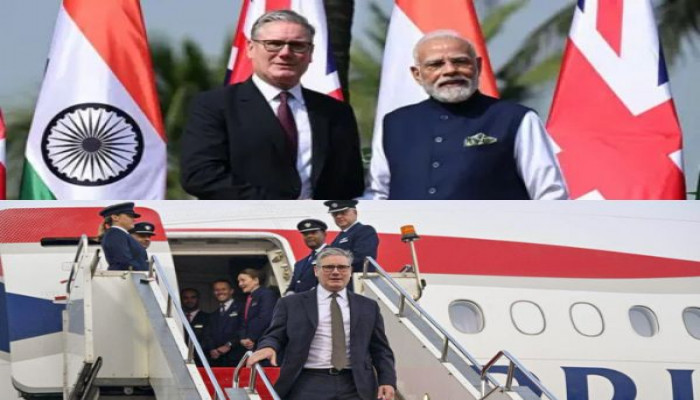India- UK deepen cooperation in trade, defence, education
- In Reports
- 06:29 PM, Oct 09, 2025
- Myind Staff
Prime Minister Narendra Modi met British Prime Minister Keir Starmer in Mumbai on Thursday during Starmer’s first official visit to India. The two leaders discussed new ways to strengthen cooperation in trade, defence, education, and regional security, marking a new chapter in the India-UK Comprehensive Strategic Partnership.
Keir Starmer arrived in Mumbai on Wednesday morning and was welcomed by Maharashtra Chief Minister Devendra Fadnavis, Deputy Chief Ministers Eknath Shinde and Ajit Pawar, and Governor Acharya Devvrat. He was accompanied by the largest ever UK trade delegation to India, which included 125 leading business figures, entrepreneurs, and educationists.
Over two days, Starmer attended a series of events aimed at boosting economic, cultural, and technological ties. On Wednesday, he joined a football event organised by the English Premier League at Mumbai’s Cooperage Ground to promote youth participation and sports diplomacy between the two countries. Later, he visited Yash Raj Films Studios in Andheri, where he announced that major Indian production houses, including YRF, will shoot films across UK locations from early 2026.
Starmer said, “Bollywood is back in Britain, and it is bringing jobs, investment and opportunity.” He described this as an example of how the India-UK trade deal is helping create new global partnerships.
In a post on X, Starmer wrote, “I’m flying the flag for British business in Mumbai, because growth in India for British businesses means more jobs for people at home.”
On Thursday, Prime Minister Modi officially welcomed Starmer in Mumbai, calling India and the UK “natural partners” built on shared democratic values. Modi said, “India and the UK are natural partners. Our relationship is built on the shared values of democracy, freedom, and the rule of law.”
Both leaders held detailed discussions covering trade, defence, education, and global stability. They reviewed the progress of the Comprehensive Economic and Trade Agreement (CETA) signed during Modi’s visit to London in July. Calling it a “historic agreement,” Modi said the pact would lower import costs, create more jobs, and benefit industries and consumers in both countries.
Modi also announced that nine UK universities will soon open campuses in India, with the University of Southampton already operating in Gurugram. He said, “The largest and most influential delegation from the education sector so far has come with Prime Minister Starmer.”
He emphasised that the India-UK partnership is “trustworthy, driven by talent and technology.” Modi added that India’s energy and the UK’s expertise “create a unique synergy.”
The two sides also discussed global peace and security. Modi said, “In the meeting today, we discussed the Indo-Pacific, peace and stability in West Asia, and the Ukraine conflict. On the issues of Ukraine and Gaza, India supports all efforts for peace through dialogue and diplomacy. In the Indo-Pacific region, we are committed to increasing maritime security.”
Defence cooperation was a key highlight of the visit. The UK signed a £ 350 million contract to supply the Indian Army with lightweight missiles manufactured in Britain. Both sides agreed to expand military training, with Indian Air Force instructors set to train officers in the Royal Air Force. An Industry Guild and Supply Chain Observatory will also be established to collaborate on critical minerals, supported by a new satellite campus at the Indian School of Mines in Dhanbad.
Starmer described the talks as the start of a “new modern partnership focusing on the future.” He called the India-UK trade pact “the biggest deal we’ve struck since we left the European Union” and said it would raise bilateral trade by 25.5 billion pounds every year.
At the CEO Summit in Mumbai, Modi said the growing partnership between India and the UK has become an important foundation for global stability and economic progress. He added, “The dynamism of India and the expertise of the UK together create a unique synergy. Our partnership is trustworthy, driven by talent and technology.”
Earlier, Commerce Minister Piyush Goyal met Starmer to discuss further trade and investment opportunities. According to Starmer’s office, 64 Indian companies will collectively invest £ 1.3 billion in the UK, supporting innovation and job creation.
In a symbolic moment ahead of Diwali, Starmer lit diyas in Mumbai and met young football players, highlighting the cultural ties between the two nations. He also expressed strong support for India’s permanent membership in the United Nations Security Council, saying, “We sit together in the Commonwealth and the G20, and we want to see India taking its rightful place in the UN Security Council.”
Starmer’s visit followed Prime Minister Modi’s trip to the UK in July, where nearly £ 6 billion worth of new investment and export deals were signed. His two-day visit to India concluded on Thursday evening, reaffirming the growing bond between New Delhi and London, built on trade, technology, education, culture, and shared democratic values.







Comments